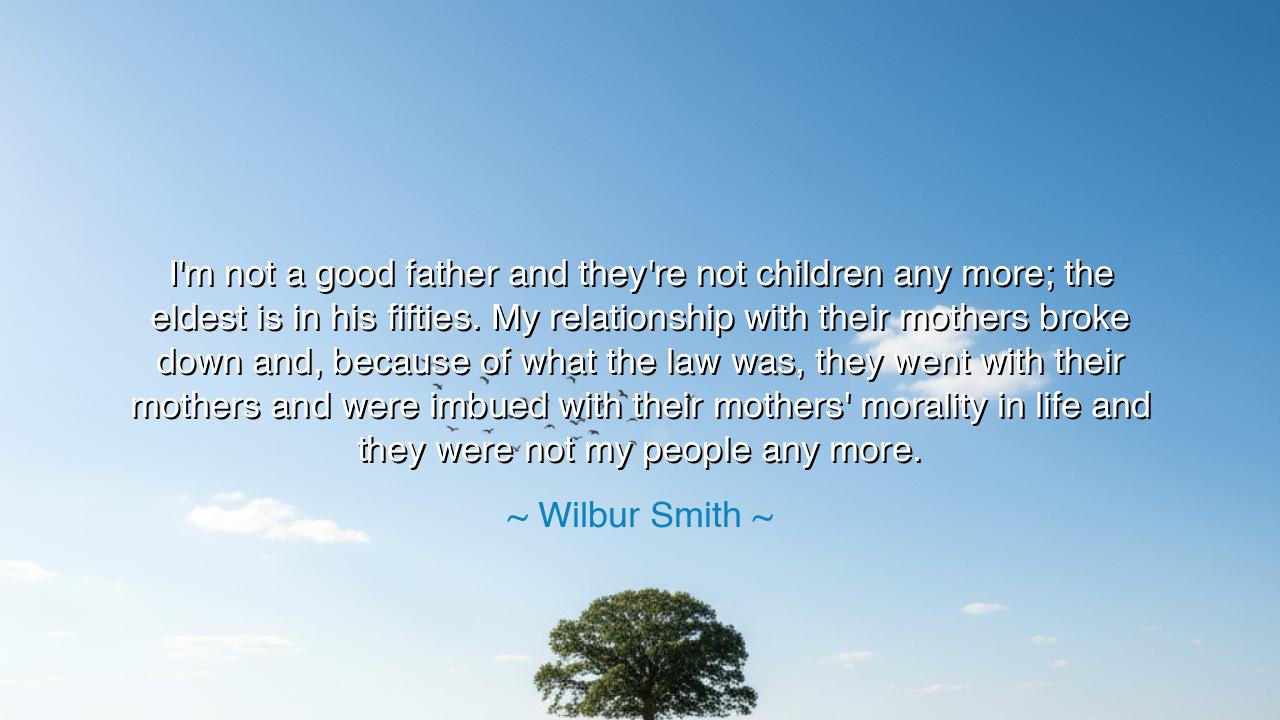
I'm not a good father and they're not children any more; the
I'm not a good father and they're not children any more; the eldest is in his fifties. My relationship with their mothers broke down and, because of what the law was, they went with their mothers and were imbued with their mothers' morality in life and they were not my people any more.






When Wilbur Smith confesses, “I’m not a good father and they’re not children any more; the eldest is in his fifties. My relationship with their mothers broke down and, because of what the law was, they went with their mothers and were imbued with their mothers' morality in life and they were not my people any more,” he speaks with the heavy voice of regret. His words carry the sorrow of one who has seen time pass beyond recall, and who feels estranged from those bound to him by blood yet distant in spirit.
The origin of this lament lies in Smith’s own life, a life both celebrated for literary triumphs and shadowed by personal struggles. He speaks not as a storyteller weaving fiction, but as a man admitting his failings. His role as father was fractured by broken relationships, by the pull of separation, and by the power of law, which carried his children away from his influence. In this, his words echo the age-old truth: that the bonds of family can be weakened when discord prevails between parents.
To say, “they were not my people any more” is a cry of alienation, a recognition that the passing of years and the shaping of values can divide even those joined by blood. The children, raised under the shadow of another’s teaching, grew into lives apart from his, carrying the imprint of their mothers’ morality. Smith’s sorrow reminds us that nurture and presence shape the soul as much as birth, and that absence in a child’s early days can create a gulf difficult to cross later.
Yet his admission also holds the austere wisdom of honesty. Few dare to speak so plainly of their shortcomings, yet Smith does, revealing that even a man of renown is not free from failure in the most intimate of duties. His words stand as both a confession and a warning — that the choices we make in relationships ripple through generations, shaping destinies beyond our sight.
Let the generations to come remember: the role of father or mother is not secured by blood alone, but by presence, nurture, and love. When relationships falter and children grow in another’s ways, estrangement may follow, leaving sorrow in its wake. Wilbur Smith’s words endure as a solemn teaching, that family is not merely inherited, but cultivated, and that to neglect it is to risk losing what is most precious.






NNNsctam Nsctam
This quote raises a lot of emotions about parenting and loss. It’s clear that the separation between Wilbur Smith and his children has had a lasting effect. Do you think it’s possible for a parent to maintain influence over their children even after they’re adults, or does the dynamic change completely once they’re raised by the other parent? How much responsibility do parents have to stay involved in their children’s lives once they’ve grown?
DCNguyen Duc Cuong
Reading this quote, it seems Wilbur Smith is grappling with the feeling of being estranged from his children. I wonder how much of that is due to the situation itself, and how much is a reflection of his own actions. Do you think fathers in similar situations should take more responsibility in maintaining relationships, or are they at the mercy of circumstances like divorce and societal expectations?
DTDai Trong
This quote makes me reflect on how divorce can fracture family ties, even long after the children have grown up. The father seems to feel disconnected from his kids, but I wonder—shouldn’t family be about more than just shared values? Can’t relationships be rebuilt through love, even if the past is complicated? What do you think about the lasting impact of parental separation on children, even when they are no longer children?
GDGold D.dragon
Wilbur Smith’s words are heartbreaking because they reflect a situation that’s unfortunately all too common. When parents split, the children often end up aligning more with one side. But I wonder—does that mean the bond is broken for good, or can time and effort from both parents help mend those gaps? Is it possible to restore a meaningful connection, even if the children are adults?
HALe Hang Anh
This quote highlights how complex family relationships can become when parents separate. It seems like Wilbur Smith feels that his children were shaped more by their mothers’ influence, which makes me wonder—does a parent lose their identity in their child’s life if they aren’t there during formative years? How do you think children’s values get shaped when parents aren’t on the same page?